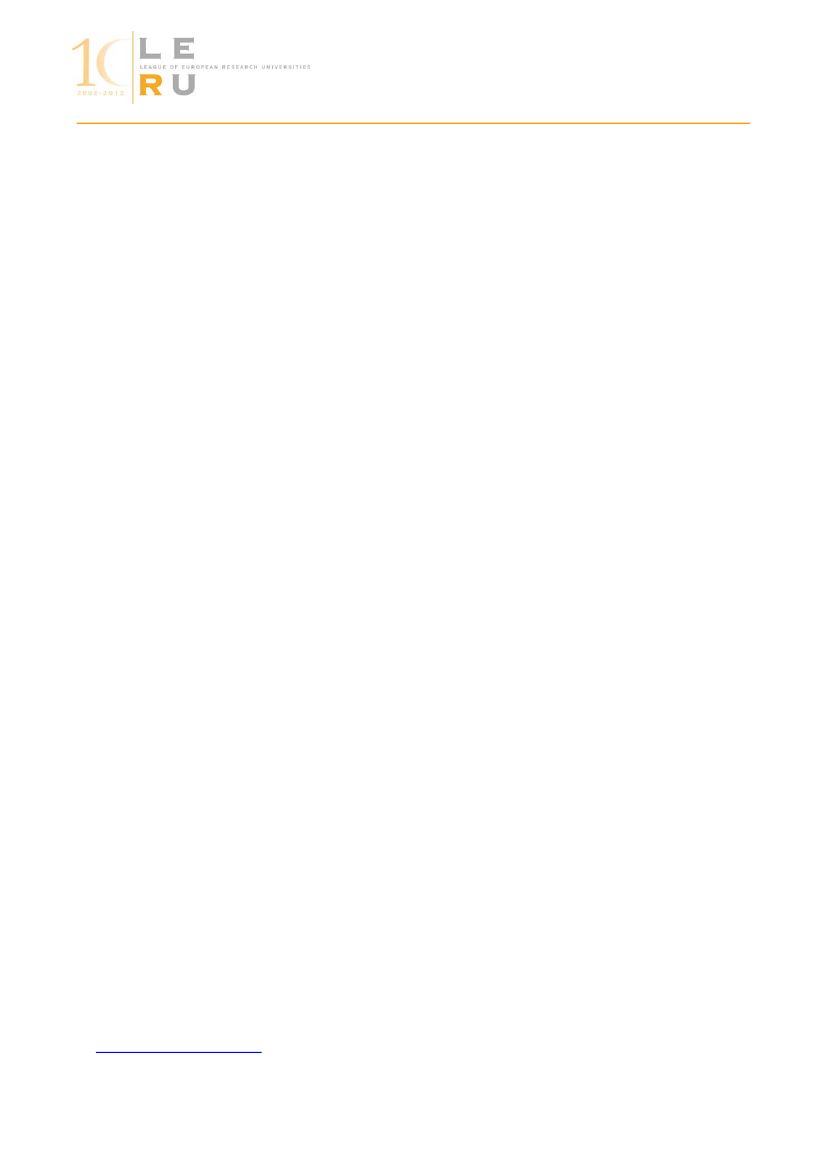Udvalget for Forskning, Innovation og Videregående Uddannelser 2012-13
FIV Alm.del Bilag 40
Offentligt
LERU OfficeSchapenstraat 343000 Leuven, Belgium
Horizon 2020: vital investment forEurope’s growth and competitivenessWhen the Heads of State and Government meet later this week to discuss the global EU budget 2014-2020,the Rectors of the League of European Research Universities (LERU) urge them to take the hard decisionsneeded to secure Europe’s future economic prosperity and competitiveness against an extremelychallenging internal and external environment.Above all, this means continued substantial investment in European research and innovation capabilities.These are fundamental to the vibrant knowledge economy that Europe needs to drive private sectorinvestment, human capital formation, employment and sustainable growth in a rapidly changing globaleconomic and political landscape and in the face of the multiple challenges that confront all our societiesin the years to come.Europe’s future prosperity and well-being depend on world-class research and innovation. Even a smallincrease in R&D has the potential to translate into per capita growth and have significant and long termeffect on employment. The rate of return for publicly funded R&D usually exceeds 30 percent1and thereare significant benefits to cross-European programmes that complement significant national investmentsin excellent research and innovation. In particular, EU funding enables the best researchers in Europe towork with each other, resulting in higher quality of research as evidenced by its citation impact. Soinvesting in excellent research and innovation at the EU level should be a top priority for all who wantsmart, sustainable and inclusive growth.The Rectors of LERU recognise, of course, that this is a time of economic difficulty, fiscal austerity andslow growth across the EU. However, this is precisely why LERU very strongly supports the R&I budget of€80 billion proposed by the European Commission in 2011 for Horizon 2020, to enable research-intensiveuniversities within Europe to undertake the kind of cutting-edge research that will underpin economicprosperity and sustainable growth. Furthermore, LERU welcomes the European Parliament’s efforts toassure a satisfactory budget on Horizon 2020 and urges them to work for an outcome that safeguardsoutstanding research and innovation across Europe. It is particularly important that no decision be takenon Horizon 2020 funding in advance or independently of a settlement of the overall EU budget for 2014-2020..Transparency of the EU research and innovation budget is also crucial. This budget should continue tofocus on the three proposed pillars of Horizon 2020: excellent science (with ERC and Marie Curie as crucialflagships), industrial leadership and grand societal challenges. No new topics or budget lines (e.g. largeresearch infrastructure projects) should be added to the final research and innovation budget, unless thebudget is increased accordingly.
Commission Staff Working Paper, Impact Assessment Accompanying the Communication from theCommission'Horizon 2020 - The Framework Programme for Research and Innovation', Brussels, 30.11.2011SEC(2011) 1427 final
1
Universiteit van Amsterdam • Universitat de Barcelona • University of Cambridge • University of Edinburgh • Albert-Ludwigs-Universität Freiburg • Université de Genève • Universität Heidelberg • Helsingin yliopisto (University ofHelsinki) •Universiteit Leiden • KU Leuven • Imperial College London • University College London • Lundsuniversitet • Università degli Studi di Milano • Ludwig-Maximilians-Universität München • University of Oxford • UniversitéPierre et Marie Curie, Paris • Université Paris-Sud 11 • Université de Strasbourg • Universiteit Utrecht • Universität Zürich
Page2 / 2LERU strongly urges the European Council to make the right choice: indeed, a choice that would beconsistent with many earlier declarations and decisions of the Council. Europe’s future prosperity andwell-being depend on world-class research and innovation and future funding should reflect this with anincrease in real terms over current programmes.Freiburg, 18 November 2012
Dymph van den Boom (Universiteit van Amsterdam),Dídac Ramírez i Sarrió (Universitat de Barcelona),Leszek Borysiewicz (University of Cambridge),Timothy O'Shea (University of Edinburgh),Hans-Jochen Schiewer (Albert-Ludwigs Universität Freiburg),Jean-Dominique Vassalli (Université de Genève),Bernhard Eitel (Universität Heidelberg),Thomas Wilhelmsson (University of Helsinki),Paul F. van der Heijden (Universiteit Leiden),Mark Waer (KU Leuven),Keith O'Nions (Imperial College London),Malcolm Grant (University College London),Per Eriksson (Lunds universitet),Gianluca Vago (Università degli Studi di Milano),Bernd Huber (Ludwig-Maximilians-Universität München),Andrew Hamilton (University of Oxford),Jean Chambaz (Université Pierre et Marie Curie),Jacques Bittoun (Université Paris-Sud),Alain Beretz (Université de Strasbourg),Bert Van der Zwaan (Universiteit Utrecht),Andreas Fischer (Universität Zürich)---- ENDS ------Notes for editors
This statement and all other LERU publications are freely available online at http://www.leru.org.The League of European Research Universities (LERU) is as an association of leading research-intensiveuniversities that share the values of high-quality teaching within an environment of internationallycompetitive research. Founded in 2002, LERU advocates education through an awareness of the frontiersof human understanding; the creation of new knowledge through basic research, which is the ultimatesource of innovation in society; and the promotion of research across a broad front in partnership withindustry and society at large.For questions about the statement, contact Prof. Kurt Deketelaere, Secretary-General, +32 499 80 89 99or[email protected].


